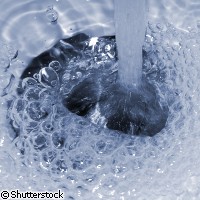EU project SMILES targets water, energy savings for industry
The European Union is steadfast in its quest to investigate and promote measures to secure a greener future. Helping in this effort is the EU-supported project SMILES (Sustainable Measures for Industrial Laundry Expansion Strategies: Smart Laundry-2015), which targets the development and launch of 16 new sustainable technologies to cut greenhouse gas emissions and secure water and energy savings, particularly in the industrial laundry sector. EU funding for the three-year project stands at EUR 2.38 million. The SMILES project partners say small- and medium-sized enterprises (SMEs) represent 90% of the industrial laundry sector in the EU-27. While it provides work for nearly 170,000 people, the sector consumes 42 million cubic metres (m3) of wash water and 60 petajoules (PJ) of energy each year. But the buck doesn't stop here. The treatment of waste water (which also totals some 40 million m3) and the release of 3.8 million tonnes of carbon dioxide (CO2) also play havoc with the environment. SMILES believes that introducing environmentally friendly, recyclable items could stem the flow of the problem. Research and industry actors from Belgium, Croatia, France, Germany, the Netherlands, Poland and Slovenia have pooled their resources to enhance innovative technologies ensuring a better industrial performance in the EU's laundry sector. The technologies will have practical uses, and will be combined for green sites or for the expansion of existing plants. The project partners will design the 'SMART Laundry-2015', a tool to save energy, cut water and energy consumption as well as CO2 emissions, and improve textile hygiene. New technologies and practices will be assessed at pilot scale and then combined in a unified design, the partners say. Validation of energy savings potential and actual energy demand will be possible via a parallel benchmarking and innovation monitoring, they add. The project consists of six Work Packages (WPs): WP1 focuses on water reduction; WP2 on energy/CO2 reduction; WP3 on chemicals reduction; WP4 on quality improvement; WP5 on integration/transfer; and WP6 on project management. The partners say that based on a full market penetration in all EU Member States by 2015, annual water and energy consumption should drop by 30% and 45%, respectively, while CO2 emissions should decrease by 47%. The project's new technologies will trigger improved laundry services, develop reusable textiles and curb throwaways and disposables by 20%. SMILES will generate economic gains of around EUR 940 million in the next decade. The partners say the project will be effective in educating and training key employees and hands-on workers to assist in the introduction of SMART Laundry-2015. Information and results obtained in the project will be communicated and disseminated to SMEs, commercial equipment suppliers and national associations. For its part, the European Commission has said that SMILES is significant because it will help the European Community meet its goals for a greener future; it has a good and clear focus on scientific and technological issues; and is well balanced in expertise. SMILES is being coordinated by the Belgian Textile Care Federation. The project kicked off in September and is scheduled to end in 2011.



